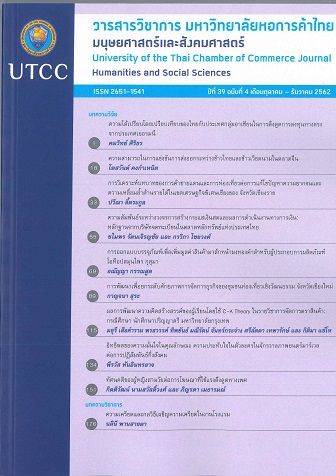Development to enhance the potentiality in business management for Chiang Mai cultural tourism communities
Main Article Content
Abstract
The objectives of this study were to (1) analyze the potentialities of Chiang Mai cultural tourism management; (2) develop the potentialities of Chiang Mai cultural tourism and (3) recommend guidelines to enhance the potentialities of cultural tourism in business management. Sample groups consisted of committees and members, totally 120 privates of 5 from 35 cultural tourism communites in Chiang Mai who were interestd and joined in the development project. Research methodology involved 3 stages; stage 1 was to analyze the potentiality in business management of local cultural tourism by SWOT analysis, focus group discussion with 30 key informants. Stage 2 was to develop the potentiality in local cultural tourism management by training, exchange opinions and knowledge between 5 experts and 5 local cultural tourism communities. Stage 3 was to recommend guidelines to raise the potentiality in business management of local cultural tourism. They exchange knowledge and opinions among 144 participants. The result for the 1st objective showed that most communities have organizational structure which were clearly set up with good unity among members. Most communities have good knowledge in culture and traditions of their communities and could make them as the selling point. The opportunities were that they have their tourism resources which can be used as tourism program. They were supported in knowledge, budget and public relations by other organizations. Their weaknesses were that they lack knowledge and abilities in business management such as organizational, marketing and financial management. Their threats were that they confronted high competition among the same entrepreneurs. They also have no connection with other entrepreneurs and communities. The result for the 2nd objective showed that their potential management were greatly improved particularly human resource management were more improved than other management. However, their potentialities in financial management were moderately improved. The result for the 3rd objective was guidelines to enhance the potentiality in business management were that they should improve their abilities in language, learn the success from other communities and apply in their operations and also use technology to publicize tourism more widely.
Article Details
ลิขสิทธิ์ของบทความ
ผลงานที่ได้รับการตีพิมพ์ถือเป็นลิขสิทธิ์ของมหาวิทยาลัยหอการค้าไทย ห้ามมิให้นำเนื้อหา ทัศนะ หรือข้อคิดเห็นใด ๆ ของผลงานไปทำซ้ำ ดัดแปลง หรือเผยแพร่ ไม่ว่าทั้งหมดหรือบางส่วนโดยไม่ได้รับอนุญาตเป็นลายลักษณ์อักษรจากมหาวิทยาลัยหอการค้าไทยก่อน
References
กระทรวงการท่องเที่ยวและกีฬา. (2559). รายได้จากการท่องเที่ยวของจังหวัดเชียงใหม่ ปี 2559. สืบค้นเมื่อ 13 มกราคม 2560, จาก www.tourismthalland.org
กาญจนา สุระ. (2559). รายงานการประชุมเชิงปฏิบัติการศึกษาปัญหาและอุปสรรคการจัดการการท่องเที่ยวเชิงวัฒนธรรมของชุมชนจังหวัดเชียงใหม่ ปี พ.ศ.2559 ณ โรงแรมดิเอมเพลส จังหวัดเชียงใหม่. เชียงใหม่: มหาวิทยาลัยราชภัฏเชียงใหม่.
กำจร หลุยยะพงศ์. (2552). การมีส่วนร่วมในการจัดการเครือข่ายด้านวัฒนธรรมของชุมชนกรณีศึกษาชุมชนปู่แจ่ม บ้านวังหม้อ ตำบลต้นธงชัย จังหวัดลำปาง: รายงานการวิจัย. ลำปาง: สำนักงานวัฒนธรรมจังหวัดลำปาง.
กิตติมา จอร์นส. (2549). กระบวนการจัดการธุรกิจชุมชนประเภทเครื่องจักรสานขององค์การบริหารส่วนตำบลธารปราสาท จังหวัดนครราชสีมา (วิทยานิพนธ์ปริญญามหาบัณฑิต ไม่ได้ตีพิมพ์). มหาวิทยาลัยมหาสารคาม.
เกศินี พรหมบุตร. (2553). การมีส่วนร่วมของชุมชนในการจัดการการท่องเที่ยวเชิงวัฒนธรรม ตำบลเวียง อำเภอเชียงแสน จังหวัดเชียงราย (วิทยานิพนธ์ปริญญามหาบัณฑิต ไม่ได้ตีพิมพ์). มหาวิทยาลัยแม่ฟ้าหลวง, เชียงราย.
ขวัญกมล ดอนขวา. (2556). การจัดการธุรกิจชุมชนบนพื้นฐานปรัชญาของเศรษฐกิจพอเพียง: รายงานการวิจัย.นครราชสีมา: มหาวิทยาลัยเทคโนโลยีสุรนารี.
จิราภา ฉิมสุข. (2553). ศักยภาพการจัดการการท่องเที่ยวเชิงวัฒนธรรม (วิทยานิพนธ์ปริญญามหาบัณฑิต ไม่ได้ตีพิมพ์). มหาวิทยาลัยขอนแก่น.
จุลศักดิ์ ชาญณรงค์. (2546). การศึกษาโครงสร้างองค์กรธุรกิจชุมชน: กรณีศึกษากลุ่มแม่บ้านผลิตภัณฑ์กล้วย จังหวัดนนทบุรี: รายงานการวิจัย. กรุงเทพฯ: ทบวงมหาวิทยาลัย.
ฐนันดร์ศักดิ์ บวรนันทกุล. (2557). การเสริมสร้างศักยภาพการพัฒนาทรัพยากรมนุษย์. วารสารวิชาการมหาวิทยาลัยปทุมธานี, 156(6), 186-194.
ณภัทร กุลนันท์. (2552). การพัฒนาศักยภาพการท่องเที่ยวเชิงวัฒนธรรมอำเภอสันทราย จังหวัดเชียงใหม่: รายงานการวิจัย. กรุงเทพฯ: สำนักงานคณะกรรมการการอุดมศึกษา.
ณรงค์ เพ็ชรประเสริฐ. (2551). ธุรกิจชุมชน: เส้นทางที่เป็นไปได้. กรุงเทพฯ: สำนักงานกองทุนสนับสนุนการวิจัย.
ดรุณ ไคร้ศรี. (2551). การพัฒนาศักยภาพ. สืบค้นเมื่อ 24 พฤษภาคม 2561, จาก www.cdd.go/th/creat/november47
ธีระพล ศิระบูชา. (2550). การจัดการธุรกิจชุมชนประเภทเครื่องหนัง (รองเท้า) ขององค์การบริหารส่วนตำบลหนองหาน จังหวัดอุดรธานี: รายงานการวิจัย. มหาสารคาม: มหาวิทยาลัยมหาสารคาม.
นภาพร จันทร์ฉาย. (2558). ประสิทธิภาพการพัฒนาการท่องเที่ยวอย่างยั่งยืนจากนโยบายภาครัฐสู่การปฏิบัติในระดับท้องถิ่น กรณีศึกษาอำเภอหัวหิน จังหวัดประจวบคีรีขันธ์: รายงานการวิจัย. กรุงเทพฯ: มหาวิทยาลัยราชภัฏสวนดุสิต.
นรินทร์ สังข์รักษา. (2552). เครือข่ายการผลิตสินค้าการเกษตรและห่วงโซ่อุปทานของจังหวัดนครปฐมเพื่อการท่องเที่ยว: รายงานการวิจัย. กรุงเทพฯ: สำนักงานการวิจัยแห่งชาติ.
นันทิยา หุตานุวัตร, และณรงค์ หุตานุวัตร. (2552). การพัฒนาองค์กรชุมชน. กรุงเทพฯ: สถาบันพัฒนาองค์กรชุมชน.
นิศารัตน์ จุลวงศ์. (2551). การจัดการการท่องเที่ยวโดยชุมชน วิสาหกิจชุมชนท่องเที่ยวเชิงเกษตรล่องเรือชมสวนเลียบคลองมหาสวัสดิ์ อำเภอพุทธมณฑล จังหวัดนครปฐม (วิทยานิพนธ์ปริญญามหาบัณฑิต ไม่ได้ตีพิมพ์). มหาวิทยาลัยศิลปากร, นครปฐม.
บุญเลิศ จิตตั้งวัฒนา. (2549). อุตสาหกรรมการท่องเที่ยว. กรุงเทพฯ: Play and Design.
พรทิพย์ กำเนิดแจ้ง. (2553). การจัดการชุมชนวัฒนธรรม ตำบลหนองขาว อำเภอท่าม่วง จังหวัดกาญจนบุรี: รายงานการวิจัย. กาญจนบุรี: สำนักงานวัฒนธรรมจังหวัดกาญจนบุรี.
ยุทธ ไกยวรรณ. (2552). สถิติเพื่อการวิจัย. กรุงเทพฯ: พิมพ์ดี.
ยุพาพร รูปงาม. (2545). การมีส่วนร่วมของข้าราชการสำนักงบประมาณในการปฏิรูประบบราชการ (วิทยานิพนธ์ปริญญามหาบัณฑิต ไม่ได้ตีพิมพ์). สถาบันบัณฑิตพัฒนบริหารศาสตร์, กรุงเทพฯ.
วีระพล ทองมา. (2552). การจัดการการท่องเที่ยวเชิงวัฒนธรรมตามแนวทางเศรษฐกิจพอเพียงอย่างยั่งยืนของตำบลแม่กรณ์ อำเภอฝาง จังหวัดเชียงใหม่: รายงานการวิจัย. เชียงใหม่: มหาวิทยาลัยแม่โจ้.
ศิริวรรณ เสรีรัตน์. (2551). ธุรกิจทั่วไป: ความรู้เบื้องต้นเกี่ยวกับการประกอบธุรกิจ. กรุงเทพฯ: ธีระฟิลม์และไซเท็กซ์.สถาบันการท่องเที่ยวโดยชุมชน. (2559). ข้อมูลการท่องเที่ยวชุมชนในจังหวัดเชียงใหม่. สืบค้นเมื่อ 11 เมษายน 2560, จาก www.cbt-i.or.th
สำนักงานเลขาธิการสภาผู้แทนราษฏร. (2558). วาระพัฒนาที่ 1 การพัฒนาด้านการท่องเที่ยว. กรุงเทพฯ: ผู้แต่ง.
สุกัญญา ดวงอุปมา. (2557). แนวทางการพัฒนาศักยภาพการจัดการที่ดีของวิสาหกิจชุมชนในจังหวัดกาฬสินธ์. วารสารการพัฒนาชุมชนและคุณภาพชีวิต, 2(2), 133-139.
สุรีย์ เข็มทอง, และอโณทัย งามวิชัยกิจ. (2561). การพัฒนาศักยภาพบุคลากรด้านการบริการในธุรกิจโรงแรมขนาดเล็ก: กรณีศึกษาโรงแรมในจังหวัดเลย. วารสารวิชาการบริหารธุรกิจสมาคมสถาบันอุดมศึกษาแห่งประเทศไทย, 7(1) 38-53.
เสรี พงศ์พิศ. (2551). ปัญหาและผลกระทบสำหรับชุมชนและแนวทางการแก้ไขจากการส่งเสริมอุตสาหกรรมการท่องเที่ยว.ในการประชุมเชิงปฏิบัติการเรื่องการพัฒนากลยุทธ์การท่องเที่ยวอย่างยั่งยืน ณ มหาวิทยาลัยราชภัฏพระนคร วันที่ 22 กันยายน 2551. กรุงเทพฯ: มหาวิทยาลัยราชภัฏพระนคร.
องค์การบริหารการพัฒนาพื้นที่พิเศษเพื่อการท่องเที่ยวอย่างยั่งยืน. (2556). การจัดการการท่องเที่ยวเชิงวัฒนธรรม.สืบค้นเมื่อ 24 มกราคม 2559, จาก www.dsta.or.th./media/publication
อภิชัย พันธเสน, และปัทมาวดี โพชนุกูล ซูซูกิ. (2548). การประเมินปัญหาและความต้องการของธุรกิจชุมชน.กรุงเทพฯ: สถาบันเพิ่มผลผลิตแห่งชาติ.
อัจฉรา หลาวทอง. (2550). การจัดการวิสาหกิจชุมชนด้านหัตถกรรม กรณีศึกษาตำบลล่อนทอง จังหวัดบุรีรัมย์: รายงานการวิจัย. กรุงเทพฯ: สำนักงานการวิจัยแห่งชาติ.
Baktygulov, S., & Damira, R. (2010). Creating value for all-community-based tourism GM case study. New York, NY: United Nations Development Program.
Creighton, J. L. (2005). The public participation handbook: Making better decision through citizen involvement. San Francisco, CA: Jossey Bass.
Crouch, G. I., & Ritchie, J. R. B. (1999). Tourism, competitiveness and societal prosperity. Journal of Business Research, 44(3), 137-152.
Frank, F., & Smith, A. (2002). The community development handbook: A tool to build community capacity. Ottawa: Human Resource Development Canada.
Hall, D., Kirkpatrick, J., & Mitchell, M. (2005). Rural tourism and sustainable business. Toronto, Canada: Channel View.
Mathis, R. L., & Jackson, J. N. (2008). Human resource management (12th ed.). Nashville, TN: South-Western.
Miller, N. J., & Besser, T. J. (2000). The importance of community values in small business strategy formation: Evidence from rural work. Journal of Small Business Management, 38(1), 68-85.
Mousavi, S., Doratli, S., & Moradiahari, F. (2016). Defining cultural tourism International Conference on Civil, Architecture and Sustainable Development (CASO-2016) Dec 1-2, 2016, London (UK). Retrieved August 24, 2019, from www.doi.org/10.15242/ICEE.DIR 1215411
United Nations Educational, Scientific and Cultural Organization. (2004). The effect of tourism on culture and
the environmental in Asia and the Pacific: Tourism and heritage site management in Luang Prabang PDR. Retrieved August 24, 2019, from www.unesdoc.org/ark:/48223


